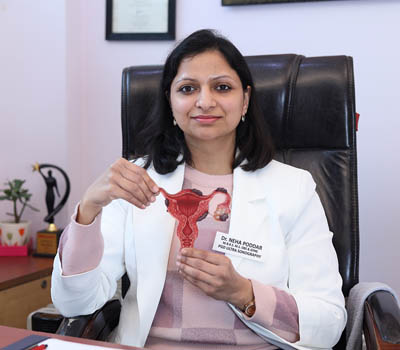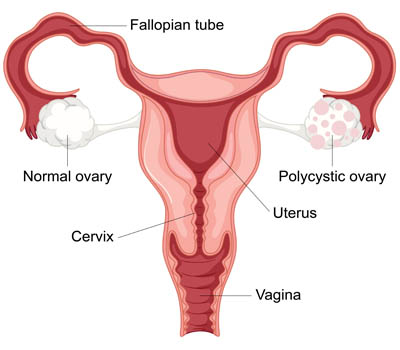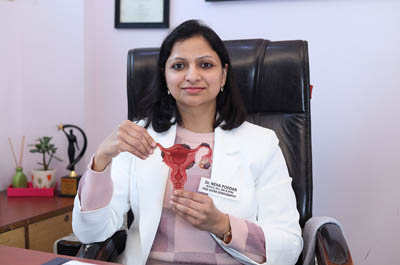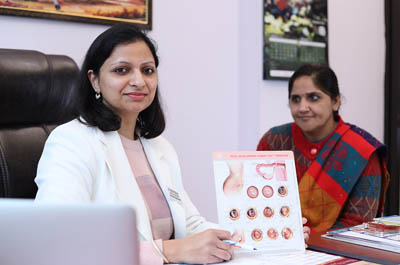
Hormonal Disorders: Understanding, Symptoms, Causes, Diagnosis and Treatment at Precision Gynaecology with Dr. Neha Poddar
Welcome to Precision Gynaecology by Dr. Neha. Our hospital is dedicated to providing comprehensive care for women experiencing hormonal disorders. Hormonal imbalances can significantly impact a woman's health and quality of life. Dr. Neha and her team are here to guide you through understanding, diagnosing, and treating these conditions with precision and compassion.
Understanding Hormonal Disorders:
Hormonal disorders occur when there is an imbalance in the levels of hormones in the body. These imbalances can affect various bodily functions and lead to a range of symptoms. Common hormonal disorders include polycystic ovary syndrome (PCOS), thyroid disorders, and menopause-related issues. Understanding the nature of these disorders is the first step toward effective management.
Symptoms of Hormonal Disorders:
Hormonal disorders can manifest in various ways, depending on the specific condition. Common symptoms include:
-
Irregular menstrual cycles
-
Weight gain or loss
-
Fatigue
-
Mood swings
-
Hair loss or excessive hair growth
-
Acne
-
Hot flashes
-
Infertility
-
Changes in libido

Causes:
The causes of hormonal disorders are diverse and can include:
-
Genetic factors
-
Stress
-
Poor diet and nutrition
-
Obesity or significant weight changes
-
Underlying medical conditions such as diabetes or autoimmune diseases
-
Medications or treatments affecting hormonal balance
Diagnosis:
Accurate diagnosis of hormonal disorders is crucial for effective treatment. Dr. Neha employs a combination of detailed medical history, physical examinations, and advanced diagnostic tests to identify the underlying cause of your symptoms. Common diagnostic tools include blood tests, ultrasound imaging, and hormone level assessments.
Treatment Options:
Treatment for hormonal disorders varies based on the specific condition and its severity. Options may include:
-
Lifestyle and dietary changes
-
Medication to regulate hormone levels
-
Hormone replacement therapy
-
Surgical interventions in certain cases
-
Regular monitoring and follow-up appointments to adjust treatment plans as needed
Importance of Early Diagnosis and Treatment:
Early diagnosis and treatment of hormonal disorders are essential to prevent complications and improve quality of life. Delaying treatment can lead to worsening symptoms and increased risk of conditions such as cardiovascular disease, diabetes, and osteoporosis. Early intervention can help manage symptoms effectively and reduce long-term health risks.


Support and Next Steps:
At Precision Gynaecology, we understand that dealing with hormonal disorders can be challenging. Dr. Neha and her team are committed to providing ongoing support and guidance throughout your treatment journey. We encourage you to schedule a consultation if you suspect you have a hormonal imbalance. Together, we can develop a personalized treatment plan to help you achieve optimal health and well-being.
FAQS
Hormonal disorders can manifest in various ways, and common symptoms include irregular menstrual cycles, excessive hair growth (hirsutism), acne, weight gain or difficulty losing weight, mood swings, and fatigue. If you are experiencing any of these symptoms, Dr. Neha Poddar at Precision Gynaecology can help diagnose and manage your condition with personalized treatment plans.
Dr. Neha Poddar employs a comprehensive approach to diagnose hormonal disorders. This typically includes a detailed medical history review, physical examination, and specific diagnostic tests such as blood tests to measure hormone levels, ultrasound scans, and other relevant investigations. Early diagnosis and intervention are crucial for effective management.
Treatment for hormonal disorders varies depending on the specific condition and its severity. Dr. Neha Poddar offers a range of treatment options, including lifestyle and dietary changes, medication to regulate hormone levels, and in some cases, surgical interventions. Personalized care plans are developed to address each patient's unique needs and improve their quality of life.
Yes, lifestyle changes can significantly impact the management of hormonal disorders. Dr. Neha Poddar emphasizes the importance of a balanced diet, regular exercise, stress management, and adequate sleep in maintaining hormonal balance. Patients are provided with tailored advice and support to implement these changes effectively.

PCOS and Hyperprolactinemia: Understanding, Symptoms, Causes, Diagnosis, and Treatment at Precision Gynaecology with Dr. Neha Poddar
Welcome to Precision Gynaecology by Dr. Neha. Our hospital specializes in the diagnosis and treatment of various hormonal disorders, including Polycystic Ovary Syndrome (PCOS) and Hyperprolactinemia. These conditions can significantly impact a woman's health and well-being, and we are here to provide expert care and support.
Understanding PCOS:
Polycystic Ovary Syndrome (PCOS) is a common hormonal disorder affecting women of reproductive age. It is characterized by the presence of multiple small cysts on the ovaries, irregular menstrual cycles, and elevated levels of androgens (male hormones). PCOS can lead to various health issues, including infertility, metabolic problems, and an increased risk of diabetes and heart disease.
Symptoms of PCOS:
PCOS can present with a variety of symptoms, which may include:
-
Irregular or absent menstrual periods
-
Excessive hair growth (hirsutism)
-
Acne
-
Weight gain or difficulty losing weight
-
Thinning hair or hair loss
-
Darkening of the skin in certain areas
-
Difficulty getting pregnant

Causes of PCOS:
The exact cause of PCOS is not fully understood, but several factors may contribute to its development:
-
Insulin resistance
-
Hormonal imbalances
-
Genetic predisposition
-
Low-grade inflammation
Understanding Hyperprolactinemia:
Hyperprolactinemia is a condition characterized by an abnormally high level of prolactin in the blood. Prolactin is a hormone produced by the pituitary gland that plays a crucial role in lactation. Elevated prolactin levels can interfere with the normal function of the ovaries and lead to various reproductive and menstrual issues.
Symptoms of Hyperprolactinemia:
Symptoms of hyperprolactinemia can vary but may include:
-
Irregular menstrual periods or amenorrhea (absence of menstruation)
-
Galactorrhea (milk production not related to childbirth or nursing)
-
Infertility
-
Decreased libido
-
Headaches
-
Visual disturbances
Understanding Hyperprolactinemia:
Hyperprolactinemia is a condition characterized by an abnormally high level of prolactin in the blood. Prolactin is a hormone produced by the pituitary gland that plays a crucial role in lactation. Elevated prolactin levels can interfere with the normal function of the ovaries and lead to various reproductive and menstrual issues.
Causes of Hyperprolactinemia:
Several factors can cause hyperprolactinemia, including:
-
Pituitary tumors (prolactinomas)
-
Medications that affect dopamine levels
-
Hypothyroidism
-
Chest trauma or surgery
-
Other medical conditions affecting the pituitary gland
Diagnosis of PCOS and Hyperprolactinemia:
Dr. Neha employs a comprehensive approach to diagnose PCOS and hyperprolactinemia, including:
-
Detailed medical history and physical examination
-
Blood tests to measure hormone levels
-
Ultrasound imaging to examine the ovaries
-
MRI or CT scans for detailed imaging of the pituitary gland (if hyperprolactinemia is suspected)
Treatment Options:
Treatment for PCOS and hyperprolactinemia is tailored to each patient's needs and may include:
-
Lifestyle modifications, such as diet and exerciseMedications to regulate menstrual cycles and manage symptomsInsulin-sensitizing drugs for PCOSDopamine agonists for hyperprolactinemiaSurgery for severe cases of prolactinomasOngoing monitoring and follow-up care to adjust treatment as needed
Importance of Early Diagnosis and Treatment:
Early diagnosis and treatment of PCOS and hyperprolactinemia are crucial for preventing complications and improving quality of life. Timely intervention can help manage symptoms effectively, reduce the risk of long-term health issues, and improve fertility outcomes.


Support and Next Steps:
At Precision Gynaecology, Dr. Neha and her team are dedicated to providing personalized care and support for women with PCOS and hyperprolactinemia. If you are experiencing symptoms or have concerns about these conditions, we encourage you to schedule a consultation. Together, we can develop a tailored treatment plan to help you achieve optimal health and well-being.
FAQS
Polycystic Ovary Syndrome (PCOS) and Hyperprolactinemia can present with a range of symptoms. Common signs of PCOS include irregular menstrual cycles, excessive hair growth, acne, weight gain, and difficulty getting pregnant. Hyperprolactinemia symptoms may include irregular periods, breast milk production unrelated to pregnancy or breastfeeding, and headaches. Dr. Neha Poddar at Precision Gynaecology specializes in diagnosing and managing these conditions to provide relief and improve your overall health.
Dr. Neha Poddar uses a thorough diagnostic approach to identify PCOS and Hyperprolactinemia. For PCOS, the diagnosis typically involves a review of medical history, physical examination, blood tests to measure hormone levels, and ultrasound imaging of the ovaries. Hyperprolactinemia diagnosis includes blood tests to check prolactin levels and imaging studies like MRI if needed. Early and accurate diagnosis is essential for effective treatment.
Treatment for PCOS and Hyperprolactinemia is tailored to each patient's specific needs. For PCOS, Dr. Neha Poddar may recommend lifestyle changes, medications to regulate menstrual cycles and manage symptoms, and fertility treatments if needed. Hyperprolactinemia treatment often includes medications to reduce prolactin levels, and addressing any underlying causes. Personalized care plans are designed to manage symptoms and improve quality of life.
Yes, lifestyle changes play a crucial role in managing both PCOS and Hyperprolactinemia. Dr. Neha Poddar emphasizes the importance of a healthy diet, regular exercise, weight management, and stress reduction. These changes can help regulate menstrual cycles, reduce symptoms, and improve overall well-being. Patients receive personalized guidance and support to make these changes effectively.
- General Gynae
- Menstrual Disorders
- Vaginal discharge
- Cervical Cancer - Screening & Vaccination
- Pelvic inflammatory disease (PID)
- Infertility treatment (IVF & IUI)
- Uterine polyps
- Septate Uterus (Uterine Septum)
- Uterine Fibroids
- Ovarian Cysts
- Dermoid Cysts
- Ectopic Pregnancy
- Endometriosis
- Menopause
- Hormonal Disorders
- PCOS and Hyperprolactinemia
- Gynae Endoscopy
- Uro Gynae
Are you seeking a qualified and experienced gynecologist and obstetrician in Ghaziabad? Look no further than Dr. Neha Poddar!
- Call 9318413696, 9958170476
- Whatsapp 9318413696

Doctors
-

Dr. Madhu Poddar
-

Dr. R.K. Poddar
-

Dr. Neha Poddar
-

Dr. Rahul Poddar